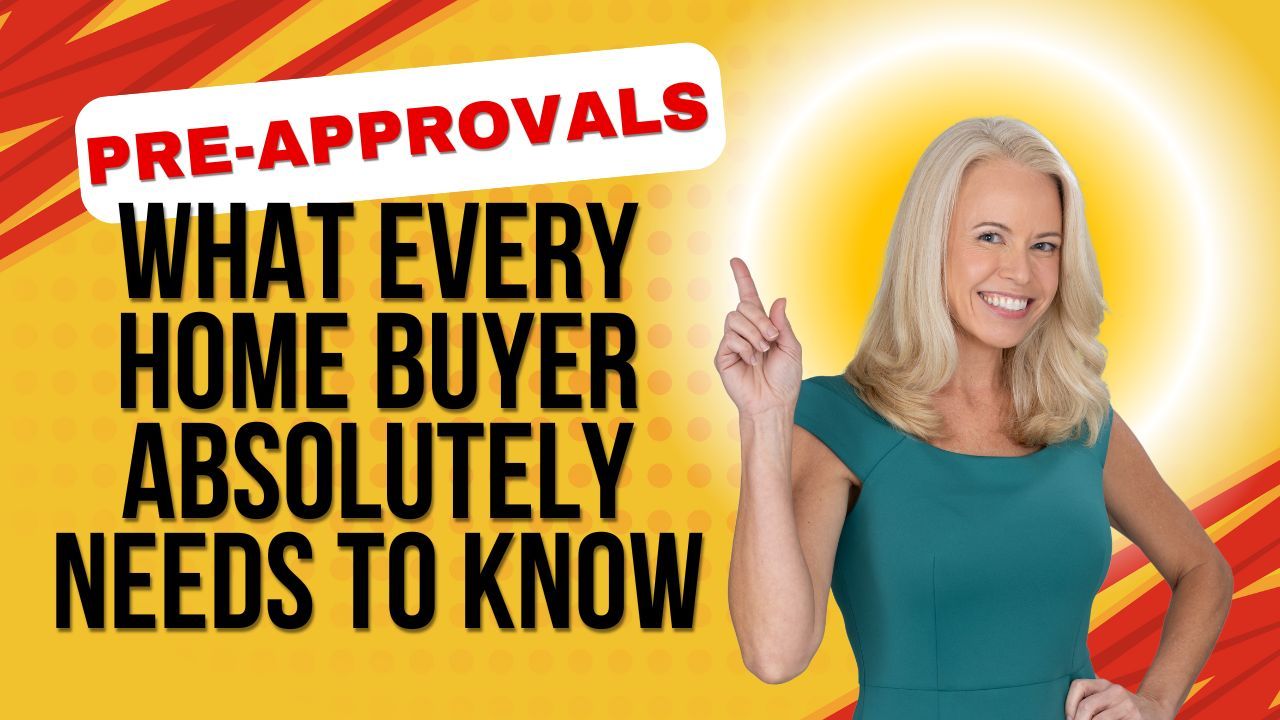How to Avoid a Common First-Time Homebuyer Mistake
How to Avoid a Common First-Time Homebuyer Mistake
Buying a home is thrilling, but it can also feel overwhelming. There's a lot to think about, particularly when it comes to the financial transition from renting to owning. One major mistake I see over and over again with first-time buyers is failing to prepare financially for the significant increase in monthly payments. If you’re paying $500, $1,000, or even $1,500 in rent today, your future mortgage could easily be double or triple that depending on where you’re buying and what kind of home you want.
This article will help you understand what to do before you take that leap into homeownership, so you avoid financial stress later.
Prepare for Your Mortgage Payment NOW
Too often, I see folks diving into a much higher monthly payment without taking the time to build a cushion or get used to the new cost. One mistake many first-time buyers make is assuming, “I’ll figure it out somehow,” or, “I’ll just adjust my spending once I have the mortgage.” Here’s the truth: changing your spending habits isn’t something that magically happens just because you own a house. You’ve got to set yourself up for success ahead of time.
Here’s what you should do: Start saving the difference between your rent and your projected mortgage payment right now—even if you’re a year or two away from buying. This is especially important if your mortgage will be significantly higher than the rent, you’re comfortable paying today. Think of this as a real-world test of whether you can handle that monthly mortgage before it’s too late.
Why Save the Difference?
Saving the difference between your rent and mortgage does more than just help you adjust to the new cost. It also helps you build up additional savings for things like:
- Your down payment
- Closing costs
- A buffer for emergencies
If you’re a veteran or using a loan program that doesn’t require a down payment, these extra savings can go toward closing costs, inspections or upgrading your new home.
Think about it—if you’re paying $1,000 a month in rent but your projected house payment will be $2,000, start putting an extra $1,000 aside now. You’d be amazed at how fast these savings can grow, especially when you’re consistently depositing money every month.
Reality Check: Your Spending Won’t Magically Change
Many people tell themselves, “I’ll tighten my spending as soon as I buy my home.” But breaking spending habits isn’t easy. If you’ve been spending freely, enjoying life, dining out, and not worrying about savings, that’s a habit. Habits don’t change overnight, and a shiny new home won’t instantly make you more financially disciplined.
Here’s something I’ve learned after working with buyers for years: the excitement of owning a home wears off. It’s like discovering a new favorite dessert—at first, you can’t get enough. But after you’ve had it maybe a dozen times, it’s just not special anymore. Similarly, the novelty of your house won’t make the new financial demands feel “worth it” when those mortgage payments start stacking up.
Without preparation, you might end up relying on credit cards just to make ends meet. This can spiral into debt, leading to refinancing to pay off those credit cards—or worse, selling your home just to stay afloat. Don’t let this happen to you.
Don’t Assume You’ll “Figure It Out”
There’s a difference between optimism and denial. Thinking, “I’ll figure it out,” without having a plan isn’t optimism—it’s risk. You need to test your ability to make this larger payment before you commit to a 30-year mortgage. This not only gives you peace of mind, but it sets you up to enjoy your home without unnecessary stress. A house should improve your quality of life—not destroy it.
How to Calculate Your Future Mortgage Payment
Thankfully, figuring out what your future mortgage payment will look like is easy. There are plenty of calculators available online, each helping you estimate your costs. If you want a reliable tool, try downloading the Rate app from Guaranteed Rate in the app store. This allows you to run calculations for mortgage payments based on the specific home you’re considering—no guessing involved.
By now, you might be thinking, “This sounds like a lot of work.” But ask yourself: Are you really ready to buy a house if this sounds overwhelming? If the idea of setting aside the difference in rent and mortgage makes you cringe, it may be a sign that homeownership isn’t the right financial step for you just yet.
On the flip side—if you’re eager to start saving and test drive your future budget, that’s fantastic. You're getting yourself prepared for the responsibility that comes with owning a home.
How Long Should You Monitor Your Budget?
It’s best to stick with this “save the difference” plan as long as you can. Even a few months will give you a good idea of how comfortable you are living with less disposable income. The longer you do it, the better prepared you’ll be. And the bonus? A habit of saving means you’ll go into homeownership more financially stable and with extra funds for emergencies.
A Simple Exercise to Prepare for Homeownership
So, here’s the big takeaway: Look at your rent. Then, calculate what your projected mortgage payment will be based on the cost of the home you want. After that, start saving the difference. Set that money aside in a separate account so it’s there when you need it, and more importantly, so you get used to living with a mortgage-sized expense every month.
If you can’t manage it now, before you have a house, that’s a sign you need to adjust either your savings habits or your expectations. This exercise isn’t about giving money away—it’s about helping yourself be comfortable and prepared when you finally sign those mortgage papers.
Conclusion
If you dream of owning a home, don’t make the mistake so many first-time buyers do. Test your budget now by saving the difference between what you pay in rent and what you’ll pay in a mortgage. It may seem like a small step, but it’ll have a big impact on your future financial stability. Reach out for help if you have any questions or want to start planning. Even if you’re not ready to buy today, this kind of preparation will make a world of difference when you're ready to make the move.
Remember, homeownership should be a joy—not a financial burden. Make the smart move now, and you’ll thank yourself later.
To Schedule a time to ask all your questions about buying a home and planning to buy a home grab a time here https://calendly.com/jennifer-beeston/.
Or call 786-933-2077
Want to learn more before we chat? Check out my channel
www.youtube.com.jenniferbeeston. There are thousands of videos all designed to educate and empower you in your homebuying journey
Book Your Mortgage Consultation Now
Ready to take the next step towards your dream home? Book a consultation with Jennifer Beeston today!
Whether you're a first-time buyer or looking to refinance, Jennifer is here to guide you through the process with ease and clarity.

Jennifer Beeston
Mortgage and Financial Education
1750 North University Drive, Suite 234
Coral Springs, FL, 33073
NMLS 247743
Guaranteed Rate, Inc. DBA Rate NMLS 2611
3940 N. Ravenswood Ave., Chicago, IL 60613
Equal Housing Lender
For licensing information, go to www.nmlsconsumeraccess.org
The information contained in this website is for general information purposes only and is considered free advice. It is believed to be reliable. The information on this website is not intended as an offer or solicitation for any mortgage product or any financial instrument. The information and materials contained in this website - and the terms and conditions of the access to and use of such information and materials - are subject to change without notice. Products and services described may differ among geographic locations. Not all products and services are offered in all states.
State License Numbers: AK - AK247743, AL - 72998, AR - Licensed, AZ - 1007541, CA - CA-DOC247743, CO - 100516570, CT - LO-247743, DC - MLO247743, DE - MLO-247743, FL - LO66900, GA - 70357, HI - HI-247743, IA - 33839, ID - MLO-2080247743, IL - 031.0054184, IN - 41478, KS - LO.0039219, KY - MC717200, LA - Licensed, MA - MLO247743, MD - Licensed, ME - Licensed, MI - 247743, MN - MN-MLO-247743, MO - MO-247743, MT - 247743, NC - I-189119, ND - NDMLO247743, NE - Licensed, NH - Licensed, NM - Licensed, NV - 66544, NY - Licensed, OH - MLO-OH.247743, OK - MLO20600, OR - 247743, SC - MLO - 247743, SD - MLO.08498, TN - 205478, TX - Licensed, VA - MLO-40552VA, VT - VT247743, WA - MLO-247743, WI - 247743, WV - LO-247743, WY – 8203
NY: Licensed Mortgage Banker - NYS Department of Financial Services, 750 Lexington Ave. Suite 2010, New York, New York 10022 Doing business in New York as Guaranteed Rate, Inc.
This site has not been approved or reviewed by the state of New York for mortgage applications.
Jennifer Beeston - All Rights Reserved



